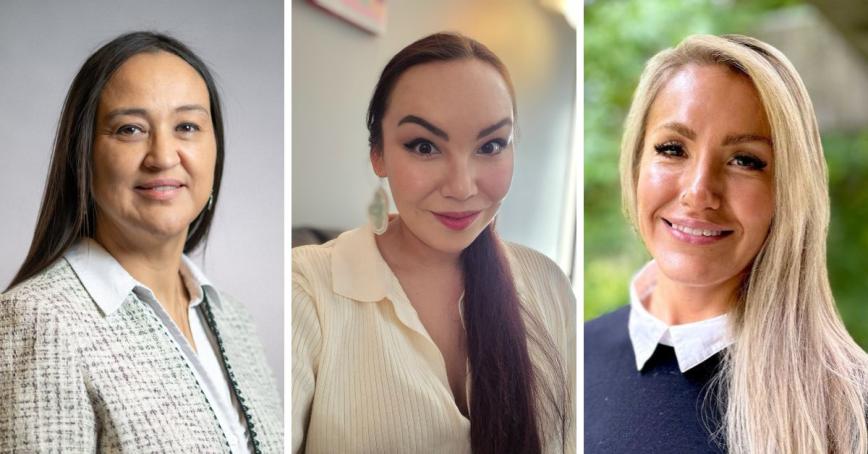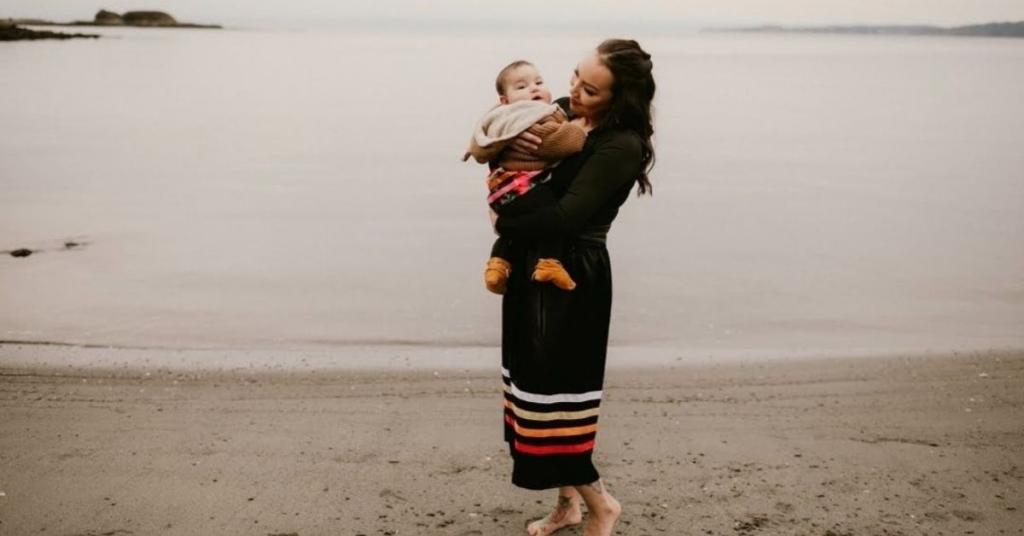Breaking cycles, building futures: Indigenous mothers in academia
Topics
Featured
Share online

What does it mean to raise children while reclaiming space in academia?
For Tasha Brooks, Christine Webster, and Tara Bouchard — three Indigenous mothers at Royal Roads University — higher education is not just a personal pursuit. It’s intergenerational. It’s a political act. And it’s a gesture of love.
They say that an important part of that work is also dismantling barriers, defying expectations, and lighting a path for others to follow — including their children.
Tasha Brooks, assistant professor in the School of Business, and a councillor for Cowichan Tribes, became a mother partway through her doctorate. But her son existed in her heart long before he arrived.
“Even before he was born, he was part of the vision I was working toward. He didn’t know it, but he was already motivating me not to quit,” says Brooks.
For Brooks, education is about more than credentials. It’s about collective restoration.
“It allows us to disrupt cycles of poverty, dependency and exclusion, and build systems that reflect our values and aspirations,” she says.
That vision of change is what carried her through late nights, emotional labour, and the invisible weight of leading in both academic and community spaces.
“Sometimes I’m teaching while my son is curled up sick next to me. Sometimes I’m in a meeting while he’s playing quietly beside me. That blending of roles isn’t ideal — but it’s how I make sure he knows he’s a priority, even while I carry out my responsibilities.”
“Our children and youth are our future. I want to exemplify that higher education is a viable path for them — one they don’t have to walk alone.” – Christine Webster
Christine Webster – assistant professor of Interdisciplinary Studies, member of RRU’s Emerging Indigenous Scholars Circle, and Nuu-chah-nulth scholar from Ahousaht – also knows what it means to walk a winding path. Supported by her grandparents, she moved to Victoria for better access to education. But as a young parent thirty years ago, her initial attempts at finding balance were difficult.
Webster recalls a time filled with “many attempts and many turning points.” As a young parent, she says she had to “reimagine how to maintain relationships and responsibilities while still prioritizing school.”
Her strength came from her community. With the help of her extended family, she returned to school and completed her PhD, grounding her research in Nuu-chah-nulth leadership.
“Our children and youth are our future,” says Webster. “I want to exemplify that higher education is a viable path for them — one they don’t have to walk alone.”

Tara Bouchard, Bachelor of Commerce student, says becoming a parent inspired her to make the world better for the next generation.
Tara Bouchard, a Bachelor of Commerce student from Little Pine First Nation, started her studies at Royal Roads after being released from the navy — balancing classes, motherhood, and a cross-country move.
“Becoming a parent instilled in me a sense of purpose as an Indigenous woman to make the world better for the next generation,” says Bouchard. “I want them to see that commitment — not perfection — is what drives change.”
Each of these women shares a powerful truth: that education, for Indigenous mothers, is not separate from parenting. It is an extension of it. A gift passed on. A commitment to something greater than themselves.
“Your lived experience is valid knowledge,” says Brooks. “You don’t have to do it perfectly. You just have to begin — one course, one application, one conversation at a time.”
They know what it means to carry community stories, to push forward when exhausted, to stay rooted while the world tries to pull them away. They know the importance of seeing someone who looks like you, sounds like you, succeeds in the places where you’ve been told you don’t belong.
“You’re not alone. Aunties are waiting for you to come — we’re here now, as professors, as mentors, as people who’ve walked that hard road and still carry the stories.” – Tasha Brooks
“These spaces weren’t made for us,” says Bouchard. “But we belong here. And we deserve to own that.”
As these women press forward, their work is not only academic — it is deeply political. Their pursuits are tied to nation-building, cultural reclamation, and community healing.
For Brooks, education isn’t neutral — it’s a lever for sovereignty.
“Embarking on this journey was never just personal,” she explains. “It was, and continues to be, a political stance.”
“Times are changing,” she adds. “Higher education isn’t the same space it once was — we now have strong Indigenous voices inside these institutions, and allies who are listening and learning.”
Above all, they recognized that education can be healing. Education can be a tool of resistance and reclamation, and it can be an act of profound hope — for those who walk beside us, and those still to come.
“You’re not alone,” says Brooks. “Aunties are waiting for you to come — we’re here now, as professors, as mentors, as people who’ve walked that hard road and still carry the stories.”